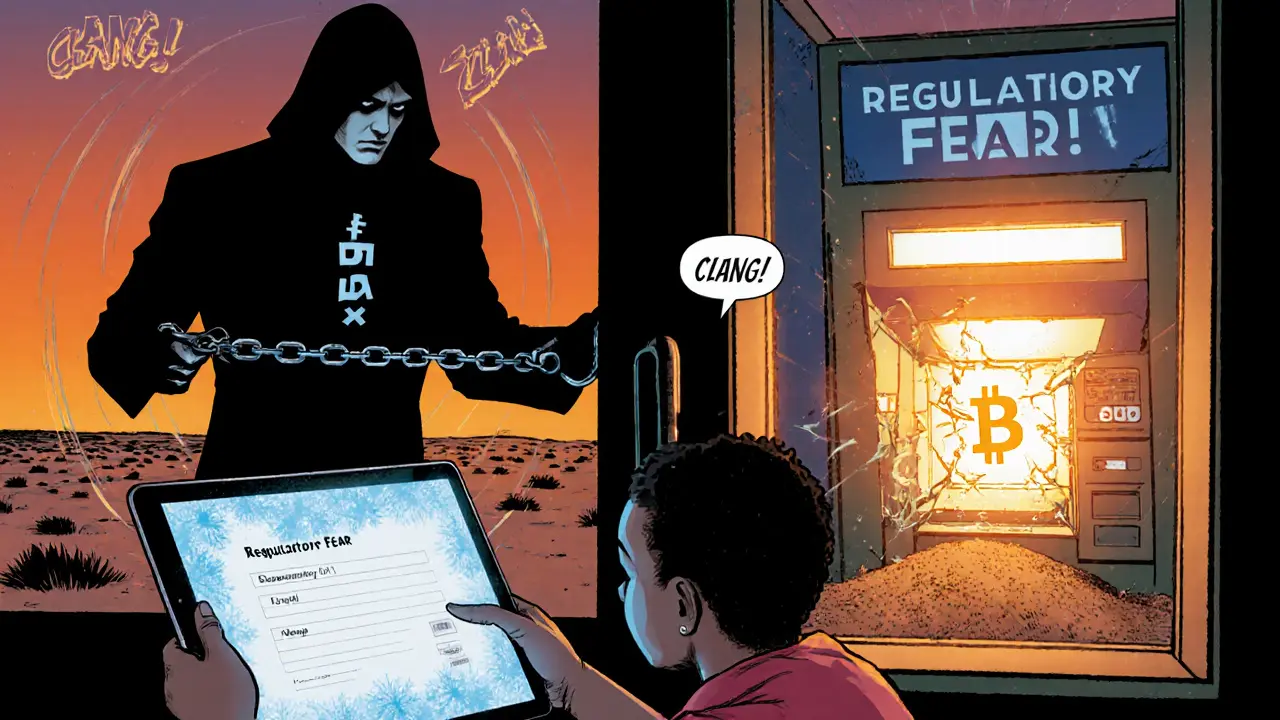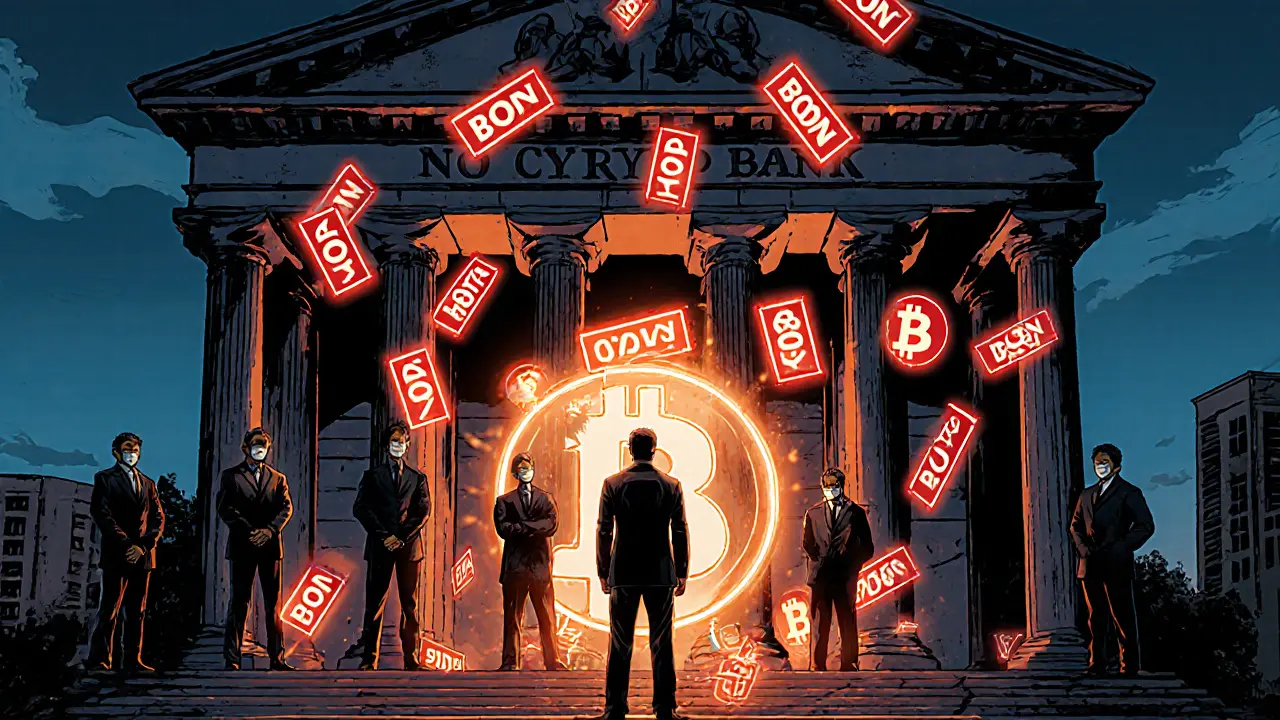Namibia Crypto Transaction Risk Checker
Check if your bank account might be restricted due to cryptocurrency activity in Namibia. This tool evaluates your risk based on the Virtual Assets Act and current banking practices.
As of 2025, if you’re trying to use Bitcoin or any other cryptocurrency in Namibia, you’re walking through a legal gray zone - one where the government says it’s not illegal, but your bank might shut your account anyway. The situation is confusing, tightly controlled, and changing slowly. You can’t buy crypto with your standard bank account. You can’t easily cash out. And if you’re running a crypto business, you’re stuck in a waiting game that could last months - or longer.
Why Namibia’s Banks Won’t Touch Crypto
The Bank of Namibia (BON) made its position clear back in 2018: cryptocurrencies are not legal tender. They don’t count as money. They’re not commodities. And if you lose money trading them, you’re on your own. No protection. No recourse. That message was blunt, and it shaped how banks operated for years. Major institutions like NedBank and Standard Bank started flagging accounts linked to crypto activity. Some users reported sudden freezes - no warning, no explanation, just locked accounts. The bank didn’t need a law to do it. It used its power over the financial system to enforce its stance.Legal experts have pushed back, arguing that BON doesn’t have the authority to ban something outright. Only Parliament can make laws. But in practice, banks follow the central bank’s lead. And for a long time, that meant silence - no crypto payments, no crypto deposits, no crypto exchanges allowed.
The Virtual Assets Act of 2023: A Shift in Tone
Everything changed in June 2023, when Namibia’s National Assembly passed the Virtual Assets Act (Act No. 10 of 2023). For the first time, digital assets were formally recognized - not as money, but as regulated property. The law created a licensing system overseen by NAMFISA, the country’s financial watchdog. Now, any company offering crypto services - exchanges, wallets, trading platforms - must apply for a license.This wasn’t about making crypto legal for everyone. It was about bringing it under control. The act requires strict anti-money laundering rules. Every transaction over NAD 20,000 (about $1,000) must carry full sender and receiver details - names, ID numbers, account info. That’s the same as the global Travel Rule adopted by the Financial Action Task Force (FATF). Namibia is now aligned with international standards, even if it’s still reluctant to call crypto money.
Provisional Licenses: The Waiting Game
In January 2025, BON granted provisional authorizations to three crypto firms: Landifa Bitcoin Trade CC, United PayPoint (Pty) Ltd, and Mindex Virtual Asset Exchange. But here’s the catch - they can’t do business yet. Not with individuals. Not with businesses. Not even with each other.These companies are in a regulatory sandbox. For six months, they’re allowed to build systems, hire staff, and prove they can meet compliance requirements. No transactions. No clients. Just paperwork, audits, and inspections. The goal is to make sure they’re ready before they touch real money.
Two of the three companies asked for extensions. Landifa got until July 31, 2025. United PayPoint until May 13. Mindex’s extension runs until November 21, 2025 - just days from now. That’s not a coincidence. The clock is ticking. If they pass the final review, they’ll get full licenses. If not, they’re out.
According to BON spokesperson Kazembire Zemburuka, the bank will inspect their setups before granting final approval. "If they are ready before the six months, the bank can inspect their setup and once approval is granted, they can engage the public," he said. But that’s not happening yet. As of late October 2025, none of these companies have been cleared to operate.

What About Regular People?
Here’s the real problem: the law regulates businesses, but banks still punish individuals. If you’re part of a crypto investment club, or even just buying Bitcoin on an offshore exchange, your bank might freeze your account. There’s no official rule saying individuals can’t own crypto. But banks act as if they can. And they do.People have lost access to savings, salaries, and business accounts because of crypto activity. Some were never charged with a crime. No court order. Just a bank notice: "Your account is restricted due to suspicious activity." That’s not transparency. It’s fear-driven enforcement.
There’s no clear path for ordinary Namibians to legally buy or sell crypto. No licensed exchange is open to the public. No ATM accepts Bitcoin. No app lets you pay for groceries with Ethereum. So while the government says it’s creating a framework, the door remains locked for everyday users.
The Paradox: Regulated But Illegal
Namibia’s current stance is contradictory. On one hand, it has passed a detailed law to license crypto businesses. On the other, the Bank of Namibia still says: "We do not recognize cryptocurrencies as legal tender." And that phrase matters. It means the central bank refuses to accept crypto as money - even if a business is licensed to trade it.This creates a legal trap. A licensed exchange can’t serve customers. A customer can’t use crypto legally. A bank can still close your account. And no one can say for sure what happens after November 21, 2025. Will Mindex get the green light? Will more companies be added? Will individuals finally be allowed to trade without fear?
Right now, the answer is no. The system is designed to delay, not to enable. It’s not about stopping crypto. It’s about controlling who gets in, when, and under what conditions.

What’s Next for Namibia’s Crypto Scene?
The future hinges on two things: whether the provisional licensees get approved, and whether the government decides to clarify the status of individual crypto use. If Mindex and the others pass inspection, they’ll become the first legal crypto gateways in Namibia. That could open the door for more players - but only if the central bank changes its tone.For now, Namibia’s approach is the most cautious in Southern Africa. South Africa allows crypto trading with minimal restrictions. Nigeria has a thriving crypto market despite official warnings. Namibia is holding back, afraid of financial instability, money laundering, or losing control over its currency.
But that caution comes at a cost. Young entrepreneurs are leaving the country to operate elsewhere. Investors are looking at Botswana or Kenya. And ordinary people are stuck - unable to use a technology that’s already in their hands.
The Virtual Assets Act was meant to bring order. But without clear rules for users, it’s just bureaucracy with a digital twist. Until Namibia answers one simple question - "Can I legally buy Bitcoin?" - the restrictions will stay, and the uncertainty will grow.
Is it legal to own Bitcoin in Namibia?
Yes, owning Bitcoin or other cryptocurrencies is not illegal in Namibia. The Virtual Assets Act of 2023 doesn’t ban personal ownership. However, the Bank of Namibia still does not recognize crypto as legal tender, and banks may restrict accounts linked to crypto activity. You can hold it, but you can’t easily spend it or cash it out through official channels.
Can I use crypto to pay for goods in Namibia?
Technically, yes - but only if a merchant agrees to accept it. The Bank of Namibia allows merchants to accept crypto as payment at their own discretion, but it’s not recognized as official currency. No businesses are officially endorsed to do this, and your bank might flag the transaction. Most merchants avoid it due to the risk of account restrictions.
Why are my bank accounts being restricted for crypto activity?
Banks like NedBank and Standard Bank are acting on guidance from the Bank of Namibia, which has warned against crypto transactions. Even though there’s no law banning individuals from using crypto, banks interpret any crypto-related activity as high-risk. They freeze accounts to avoid regulatory penalties, even without court orders. This is enforcement by policy, not by law.
Are there any licensed crypto exchanges in Namibia right now?
No. Three companies - Landifa Bitcoin Trade CC, United PayPoint, and Mindex Virtual Asset Exchange - have provisional licenses, but they are not allowed to operate yet. They’re in a six-month compliance period. As of November 2025, none have been granted full authorization to serve customers. The first licensed exchange is still months away, if it happens at all.
What happens after November 21, 2025?
Mindex Virtual Asset Exchange’s provisional license expires on November 21, 2025. The Bank of Namibia will decide whether to grant full authorization based on compliance checks. If approved, Mindex could become the first legal crypto platform in Namibia. If denied, the company will be shut down. This decision will set the tone for whether Namibia opens its crypto market or stays locked down.
Can I start a crypto business in Namibia?
Yes, but only if you’re prepared for a long, expensive process. You must apply to NAMFISA for a license under the Virtual Assets Act. You’ll need to prove you have AML/CTF systems, secure infrastructure, financial stability, and local staff. The provisional license process takes at least six months, and approval isn’t guaranteed. Many businesses fail to meet the requirements and are denied.
Bottom Line: Patience, Not Progress
Namibia’s crypto rules aren’t about stopping innovation. They’re about controlling it. The government wants to be seen as modern and compliant with global standards. But it’s afraid of what happens if crypto grows too fast. So it’s building walls - not to keep people out, but to decide who gets through, and when.For now, the only people winning are lawyers and compliance consultants. Everyone else is waiting.


Caren Potgieter
November 24, 2025 AT 07:03Jennifer MacLeod
November 25, 2025 AT 10:23Linda English
November 27, 2025 AT 08:07asher malik
November 28, 2025 AT 12:17Omkar Rane
November 30, 2025 AT 02:35David Hardy
November 30, 2025 AT 16:52Matthew Prickett
December 1, 2025 AT 19:18Julissa Patino
December 1, 2025 AT 23:06Daryl Chew
December 3, 2025 AT 13:11Tyler Boyle
December 5, 2025 AT 13:05Jane A
December 5, 2025 AT 23:19jocelyn cortez
December 7, 2025 AT 17:21Gus Mitchener
December 7, 2025 AT 21:44Jennifer Morton-Riggs
December 9, 2025 AT 00:08Belle Bormann
December 10, 2025 AT 02:52Jody Veitch
December 11, 2025 AT 02:34Dave Sorrell
December 13, 2025 AT 01:29Sky Sky Report blog
December 13, 2025 AT 14:29stuart white
December 14, 2025 AT 09:18Jenny Charland
December 14, 2025 AT 17:39